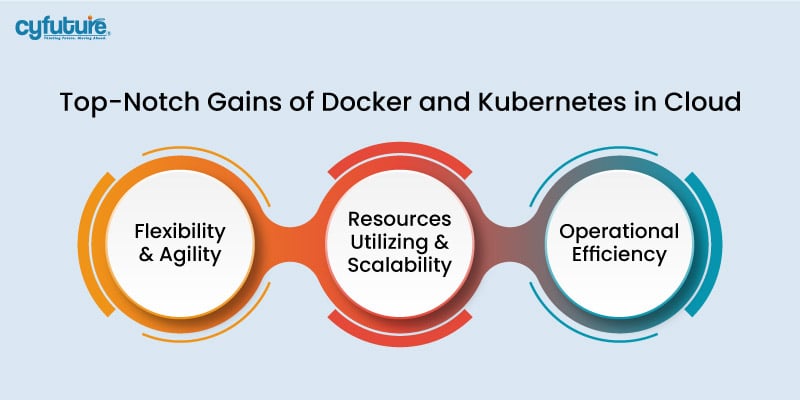-
Get Cloud GPU Server - Register Now!
Toggle navigation

Businesses’ approaches to managing and operating their IT infrastructure are profoundly changing globally. As a result of its unparalleled scalability, flexibility, and affordability, cloud computing has emerged as the cornerstone of this revolution. Furthermore, cloud service adoption has been nothing short of revolutionary in India, a rapidly developing country with a booming IT industry.
Nevertheless, its acceptance is not without its difficulties, the most significant of which is managing and coordinating complex cloud infrastructures. An analysis of Docker and Kubernetes, two technologies that are transforming cloud computing in India.
Additionally, there is an increasing need for effective and scalable cloud operational services as more Indian businesses use cloud computing. The demands of today’s businesses simply cannot be met by traditional methods of managing on-premises technology.
This is where cloud-based application deployment, scaling, and management become more effective due to the technologies of containerization and orchestration offered by Docker and Kubernetes.
In this comprehensive blog post, we will discuss the impact of Docker and Kubernetes on cloud services in India, with a focus on how these technologies affect managed clouds, cloud operating services, and migration services. Leading the way in India’s cloud revolution are Docker and Kubernetes, which enable enterprises to embrace the cloud with confidence and revolutionize application deployment and administration.
Due to factors like greater internet penetration, a growth in the demand for digital services, and government initiatives to encourage digitalization, cloud computing has developed at an exponential rate in India. Leading global cloud service providers, including Google Cloud Platform (GCP), Microsoft Azure, and Amazon Web Services (AWS), have established a strong foothold in the Indian market by providing a comprehensive range of cloud solutions tailored to the requirements of businesses in various industries.
Reliability and maximum performance in cloud computing depend on efficient administration and operation. Cloud operational services include resource optimization, provisioning, security management, and monitoring. Conventional methods for managing cloud infrastructure can be challenging and time-consuming, requiring specialized skills and knowledge.
Here is where Kubernetes and Docker come into the role
With the introduction of containerization, Docker revolutionized the packaging, deployment, and management of applications. Since all dependencies and modifications are contained within, containers provide a lightweight and portable environment for running applications. Larger resource usage, faster deployment times, and more scalability are just a few of the benefits that Docker containers provide in cloud computing.
India is a country where developers and DevOps teams use Docker extensively because it makes it easier for them to construct and launch programs. Containerized applications enable businesses to create faster and respond more quickly to shifting business needs. Docker is also a great substitute for businesses wishing to implement cloud-native technology because of its adaptability to different cloud platforms.
While Docker makes containerization easier, maintaining numerous containers across several hosts poses new issues. Kubernetes, an open-source container orchestration technology founded by Google, tackles these issues by automating the deployment, scaling, and administration of containerized applications.
Besides, Kubernetes has emerged as the favored technology in India for coordinating cloud-based containerized workloads. Kubernetes helps enterprises create durable and scalable cloud-native applications with capabilities such as autonomous scaling, self-healing, and service discovery. Furthermore, Kubernetes’ ecosystem of tools and interfaces broadens its appeal by allowing for easy connection with other cloud services and platforms.

The following are some benefits of adopting Kubernetes and Docker for cloud adoption:
Businesses can create, deploy, and scale applications with previously unheard-of speeds and agility thanks to Docker and Kubernetes. By separating programs from the hardware, containers enable seamless program mobility across public cloud environments and on-premises data centers in India.
Businesses may dynamically deploy computer resources in response to workload needs thanks to Kubernetes’ dynamic scaling features, which guarantee optimal performance and cost-efficiency. Additionally, Kubernetes’ integrated load balancing and auto-scaling features make it simple for businesses to deal with sporadic spikes in traffic.
Docker and Kubernetes free up critical time and resources for IT teams by automating repetitive activities like provisioning, deployment, and scaling. This allows them to concentrate on strategic objectives rather than tedious maintenance duties.
Moving existing apps and workloads to the cloud is one of the main drivers of cloud adoption in India. Applications may move from on-premises infrastructure to cloud environments more easily with the help of cloud migration services, which enables businesses to take advantage of the scalability, agility, and cost-effectiveness of cloud platforms.
In India, the requirement for managed cloud services is growing along with the usage of clouds. Businesses might choose to delegate the administration and upkeep of their cloud infrastructure to outside vendors by using managed cloud services, freeing them up to concentrate on their primary business functions.
The standardized and automated approach to application deployment and administration offered by Docker and Kubernetes enhances managed cloud services. Cloud providers enable enterprises to make use of the advantages of container orchestration without having to deal with the hassle of maintaining infrastructure by providing managed Kubernetes services that streamline the deployment and management of Kubernetes clusters.
To summarize, Docker and Kubernetes are accelerating cloud adoption in India by tackling fundamental issues and redefining how organizations function in the digital age. Docker and Kubernetes’ breakthrough containerization and orchestration technologies enable enterprises to confidently embrace the cloud, resulting in increased agility, scalability, and operational efficiency.
As Indian businesses increasingly rely on cloud computing to remain competitive and inventive, Docker and Kubernetes play critical roles in enabling them to fully realize the benefits of cloud technology. Docker and Kubernetes provide several benefits, ranging from easing application deployment and management to maximizing resource consumption and scalability, propelling India’s cloud revolution ahead.
Moreover, Docker and Kubernetes provide an automated and standardized approach to application deployment and maintenance, making them an excellent choice for cloud operations in India as the need for managed cloud services rises.
Ultimately, Docker and Kubernetes are transformation enablers that lead businesses toward an infinitely inventive cloud-native future. They are more than just technologies. Kubernetes and Docker adoption is now required for Indian organizations to succeed in an increasingly digital world as they embark on their cloud journeys.
Are you ready for cloud computing in India to reach its full potential? Learn about the cloud innovations and shifts that Docker and Kubernetes may bring to your company. Contact us today to learn more and embark on your cloud journey with confidence.
Two revolutionary technologies in the cloud computing space are Docker and Kubernetes. Docker makes containerization easier by enabling the packaging of apps and their dependencies into small, lightweight containers. On the other side, Kubernetes offers container orchestration, which automates the scaling, deployment, and administration of applications that are containerized. India is leading the way in cloud adoption because of the combination of Docker and Kubernetes, which makes it easier to migrate and manage apps on the cloud.
Indeed, Indian enterprises of all sizes—from start-ups to large conglomerates—can benefit from using Docker and Kubernetes. Because they are both open-source and have vibrant communities, they can be readily accessed and tailored to meet a variety of business needs. Docker and Kubernetes may be used by small and medium-sized businesses to accelerate their digital transformation initiatives and compete with larger industry players. In a similar vein, large corporations may use Docker and Kubernetes to modernize antiquated systems, boost agility, and encourage scalable innovation.
Docker and Kubernetes enable businesses to implement DevOps techniques and cloud-native designs, which has a big influence on the growth of cloud services in India. The development and operations teams can communicate more easily thanks to these technologies, which speed up the release of updates and new features. Additionally, companies may develop scalable and resilient cloud-native apps with Docker and Kubernetes that can withstand changes in the dynamic Indian business landscape.
Moving workloads and programs from on-premises infrastructure to cloud environments is known as cloud migration. By standardizing and automating the deployment and administration of applications, Docker and Kubernetes contribute to the simplification of this process. Programs may run more consistently across several cloud platforms and become more portable thanks to Docker containers. Complex application architectures can be orchestrated more easily using Kubernetes, leading to smooth cloud deployment and scalability.